Digital Innovations
One of the focus areas of Swachh Bharat Mission (Urban) has been to introduce digital innovations to not only enable people centric engagement but also accelerate the Mission progress by providing effective tools for Mission governance. Providing e-services to the people at their doorstep is one of the key focus areas of effective Governance. SBM-U actively invested in key digital innovations which had a transformational impact on how sanitation is perceived by the public, as detailed below.
1. Swachhata App: Enabling Citizens to demand better sanitation services from city administrators
Previously, complaints related to waste and sanitation issues, reported by citizens suffered from delayed response by concerned authorities, and there was no mechanism to track the status of complaints. There was a need for technology based ‘on-demand’ sanitation and waste management services for citizens, to enable them to directly report and track their grievances, and also to make municipal authorities accountable for resolving the issues on time.
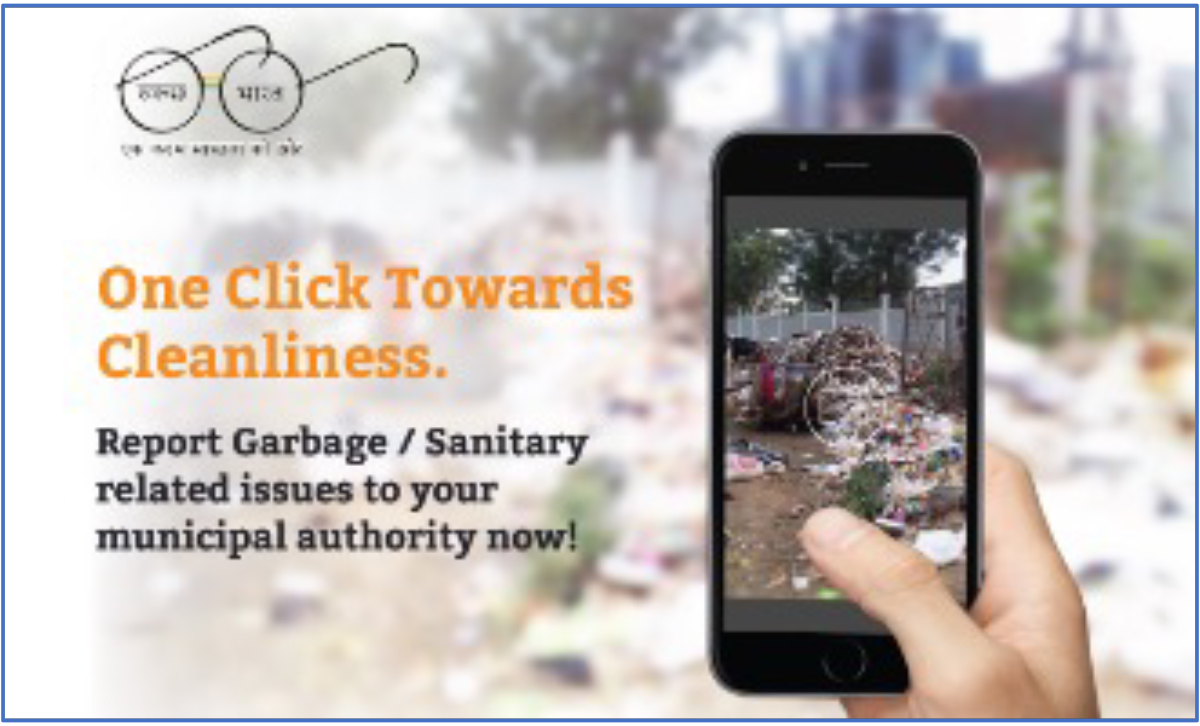
A national level citizen grievance redressal mobile app ‘Swachhata MoHUA App’ was developed to empower citizens to demand better sanitation service delivery from their city authorities. City authorities were also made accountable for providing better sanitation services to the citizens. Grievances raised by citizens are required to be resolved by city authorities within a timeframe of 8 to 48 hours, thus guaranteeing citizen satisfaction. The initiative was launched under the larger ambit of SBM-U to encourage citizens to become vigilant about cleanliness in their surroundings. The Swachhata App is being used by citizens to help City administrators spot dirty areas in the city and take necessary steps to clean them.
- Citizen spots a cleanliness related issue in the city, he/she takes a picture through the application, chooses a category and lodges a complaint.
- The complaint is then assigned to the relevant field official. The assigned official resolves the complaint and uploads a picture as proof on the app while marking the complaint as resolved.
- The status of complaint is then sent back to the citizen in the form of a notification that the complaint lodged has been resolved.
- The citizen can then give feedback on the level of satisfaction on the complaints resolutions and can also re-open the complaint if not satisfied.
- A website (www.swachh.city) has been developed for all stakeholders which allows them to review the complaints and resolution status.
- The application is available in English, Hindi and seven other regional languages.
- The performance of the cities in resolving the citizen grievances through Swachhata App has also been given weightage in the annual cleanliness survey of MoHUA – Swachh Survekshan. This has accelerated the use of Swachhata App and also ensured that the grievances raised by citizens are resolved by City administrators on time.
Swachhata App has become one of the most widely used digital grievance tool for engaging citizens to demand good sanitation services from local administration. The Swachhata App is being used in all Indian cities and has more than 2 Crore users across the country. The Swachhata App has a total of 1.8 crore users, who have posted 2.39 crore complaints, of which 2.24 crore complaints have been resolved, with a resolution of above 93.72%.
One of the focus areas of Swachh Bharat Mission (Urban) has been to introduce digital innovations to not only enable people centric engagement but also accelerate the Mission progress by providing effective tools for Mission governance. Providing e-services to the people at their doorstep is one of the key focus areas of effective Governance. SBM-U actively invested in key digital innovations which had a transformational impact on how sanitation is perceived by the public, as detailed below.
2. SBM Toilet Locator on Google Maps
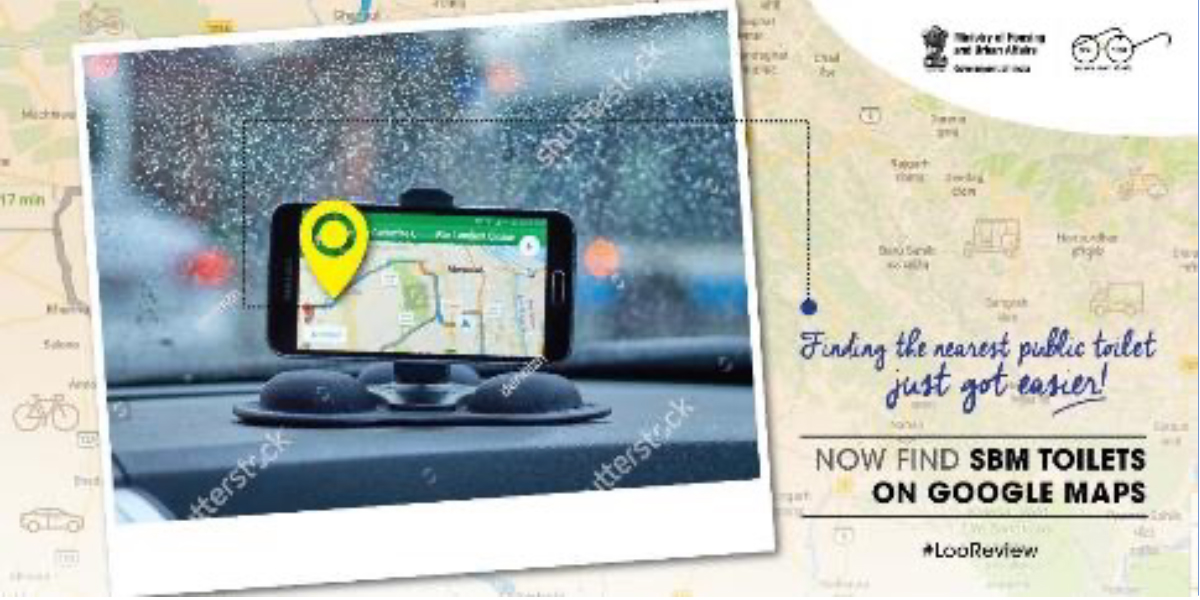
It is a well-known fact that merely constructing toilets does not ensure their usage by the intended population. A simple yet effective means was needed to ensure that citizens can easily locate and use the sanitation facilities.
In order to improve the accessibility of Public toilets to citizens in Urban India, Ministry has introduced the feature of locating Public Toilets on Google Maps. The SBM Toilet Locator App was launched by MoHUA in November 2015. Google Maps is one of the most widely - used apps for navigation purposes. Hence it was decided to upload all public toilets on Google Maps for ensuring maximum public reach. At a touch on the app, the citizens can now locate a toilet nearest to them and use conveniently.
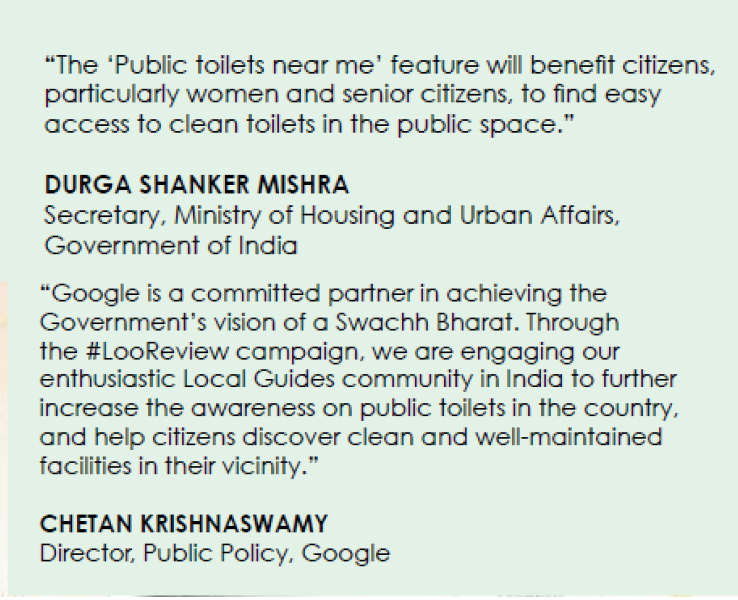
The initiative was launched to ensure accessibility of Public Toilets while also facilitating regular maintenance through continuous feedback from citizens. These include toilets located in Municipal areas, Hospitals, Malls, Bus Stands, Railway Station, Metro etc. In order to utilize the feedback given by citizens on Google Maps and help ULBs to take corrective action, a Toilet Monitoring Dashboard was launched. This facilitated real time rating and feedback on usage of public toilets for improved monitoring by concerned authorities. Apart from locating the public toilets on the App, additional information such as quality rating, facilities available, free or paid usage information were captured through the app.
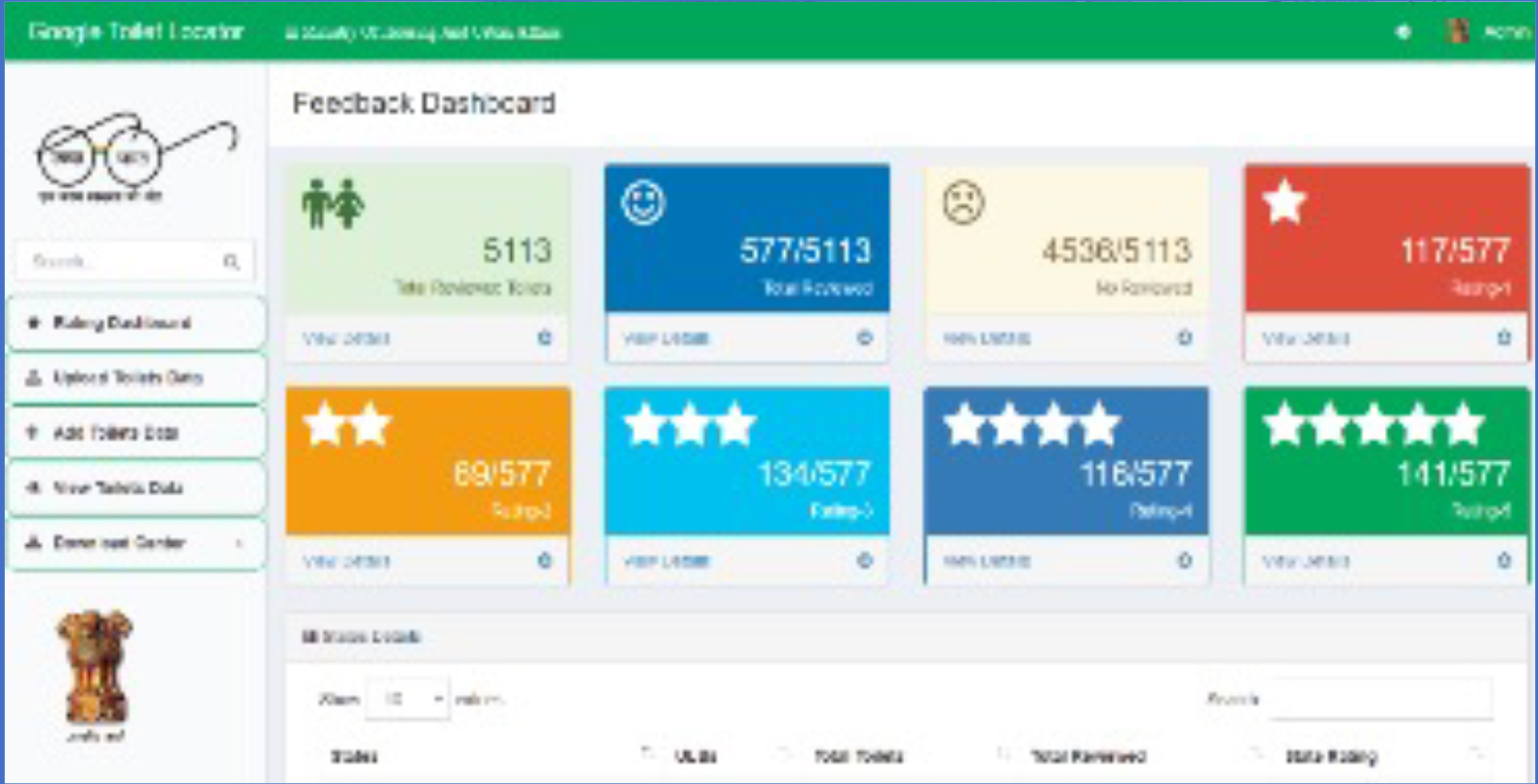 Today, over 60,000 Public Toilets (PTs) are searchable on Google Maps, across 3000 cities. More than 2.5 crore citizens till date have accessed Public Toilets on the basis of their search on Google Maps.
Based on Citizens’ feedback, ULBs are now taking up the maintenance of the Public Toilets in a more regular and focused manner.
Today, over 60,000 Public Toilets (PTs) are searchable on Google Maps, across 3000 cities. More than 2.5 crore citizens till date have accessed Public Toilets on the basis of their search on Google Maps.
Based on Citizens’ feedback, ULBs are now taking up the maintenance of the Public Toilets in a more regular and focused manner.
The digital presence of Public Toilets is helping in the access to toilets to citizens, provides a platform for citizen feedback which will ensure the maintenance of Public Toilets.
3. MY TOILET FACILITY APP – CARETAKER APP FOR MONITORING CLEANLINESS OF COMMUNITY TOILET AND PUBLIC TOILETS (CT/pts):
developed to be used across all ULBs to make public service delivery robust and satisfactory, through continuous citizen/user feedback via the caretaker of the toilet. The App is meant for the caretaker of the toilets. The caretaker can mark his/her attendance and take feedback from the user of the toilet. It is expected that the app will ensure the following:
- i) Authenticated user feedback for the CT/PT is received in every two hours
- ii) Monitoring performance of the caretaker, resulting in maintaining the cleanliness of CT/PT on an ongoing basis.
- iii) Monitoring of the opening and closing time of the CT/PT
- iv) Identifying CT/PTs that are closed or not in use
4. E-Learning portal:
Capacity Augmentation of Urban Local Bodies (ULBs) has been one of the key objectives of the Swachh Bharat Mission (Urban). With new, affordable and innovative sanitation and waste management solutions available in the marketplace, the need to train ULB officials was very high to ensure long term sustainability of Open Defecation Free mandate and effective Solid and Liquid Waste Management beyond the Mission period. It was also widely acknowledged that successfully cleaning Urban India would require large scale participation from citizens. Hence, building citizens’ awareness, knowledge and capabilities on managing a part of the waste generated by them also becomes crucial.
With over 100,000 ULB officials required to be trained, in addition to common citizens, it became necessary to leverage ICT to drive this initiative. With this intent MoHUA partnered with Microsoft to deploy project Sangam in 2015 to train municipal functionaries across India on Swachh Bharat e-Learning Portal. At present, the platform hosts 179 modules on various topics covering sanitation and waste management. Till date, 88,000 plus municipal employees have actively used the platform and successfully completed 8 Lakh+ certifications across all modules.
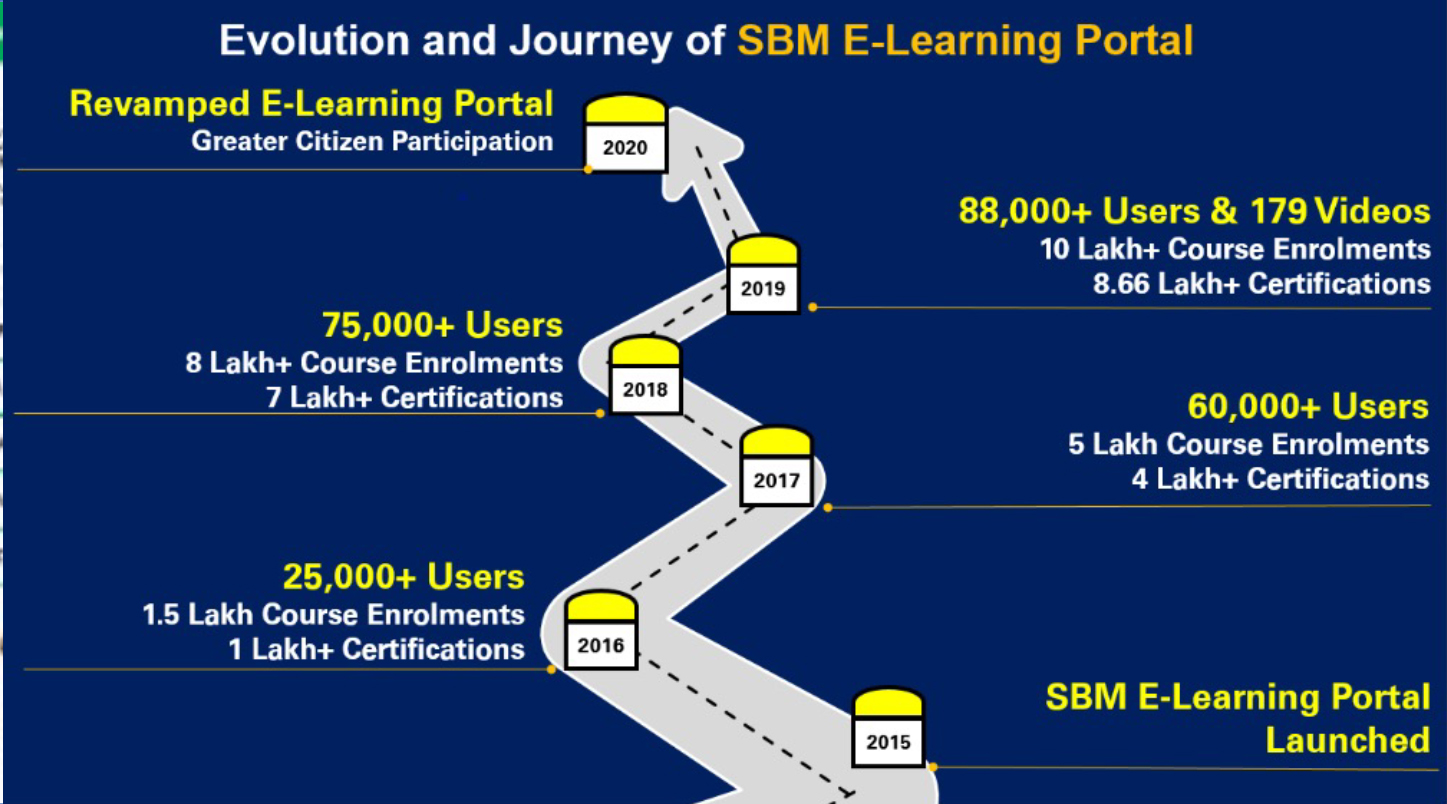 MoHUA launched mobile version of the eLearning platform in 2019 to increase the reach to targeted users. For citizens, the platform is helping to disseminate knowledge on Sanitation and Solid Waste Management while helping Bulk Waste generators to manage their own waste, citizens to contribute towards keeping their own neighbourhoods ‘Swachh’. For Urban Local Bodies, platform is helping in involving greater numbers of people in SBM and strengthen it as a Jan Andolan.
MoHUA launched mobile version of the eLearning platform in 2019 to increase the reach to targeted users. For citizens, the platform is helping to disseminate knowledge on Sanitation and Solid Waste Management while helping Bulk Waste generators to manage their own waste, citizens to contribute towards keeping their own neighbourhoods ‘Swachh’. For Urban Local Bodies, platform is helping in involving greater numbers of people in SBM and strengthen it as a Jan Andolan.



